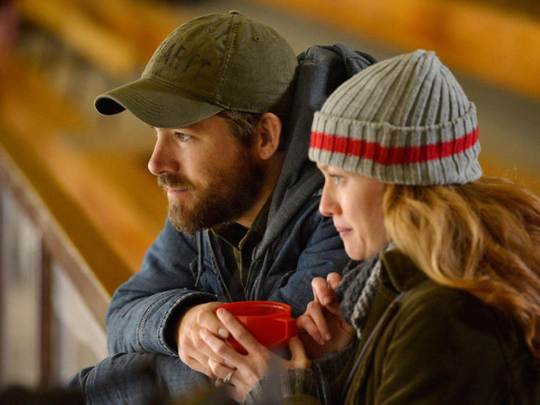
Armenian-Egyptian director Atom Egoyan teaches a filmmaking course at a Toronto university, so given the chance to chat to him last week, I asked what advice he gives most frequently.
“Get a thick skin,” he said over the phone from Canada, where he has lived and worked since moving there as a child.
It might seem standard advice for anyone putting their creative work out into the world for a career, but Egoyan was drawing from recent experiences that have reminded him, after two decades in the industry, that criticism of your work can be pretty devastating.
More so now, he says, thanks to the power of the internet.
“Critics, in order to get attention, have to be very mean,” he says.
Egoyan’s film The Captive, starring Ryan Reynolds and releasing in the UAE on Thursday, premiered at the Cannes film festival in May this year, and received boos, which are standard for Cannes, and a near-universal thrashing from the critics.
“Cannes was quite an extreme experience, I’ve never had it happen to me, although I’ve seen it happen to others” says Egoyan, who is a four-time Palme d’Or nominee and served on the Cannes jury; he also received two Oscar nominations for his 1997 film The Sweet Hereafter.
He began to wonder if the critics were right.
But a positive response from Canadian audiences when the film went on general release there earlier this month — he says it’s been his biggest film yet — restored his faith in the film.
“I am in a different place than I was before the commercial release. I think if it didn’t reach the public I would have felt that the issues were well-founded.”
“I have to say — and I never thought i would be saying this 15 years ago — that in this case it’s been really vindicated by this great public response.”
So go make up your own mind.
“I’ve never had a film that has been more split. I think critics are comparing it to very early films of mine, films I made in the 80s, that it’s in the realms of self-parody, that I am repeating myself. But we have to remember that most audiences have not seen these films [laughs]. These films were made very long ago and artists do return to certain themes.”
The film, which he calls a “dark fable”, explores the aftermath of a child kidnapping, looking at three couples: the parents, the “very disturbing” couple of the paedophile and the child, who now is a young adult, and the detectives who form a relationship around the case.
Beyond that, however, Egoyan says it explores our “culture of surveillance, of watching, of living lives vicariously through others”.
The director drew inspiration from the recent spate of kidnap victims being released as adults, he recalls reading Jaycee Dugard’s memoir of her abduction, A Stolen Life. “I’ve always been attracted to stories of how young people manage to overcome extraordinary obstacles by their own imagination.”
Abduction tales have been a cinematic staple since Fritz Lang, says Egoyan, and that may be why his film was met with such a strong reaction: He stresses it’s a fable. “That’s one of the things that might disconcert some people, that there’s a quality to the film that is very fable-like. like a [Brothers] Grimm story.
“The subject matter is delicate and there is a certain tone that people might expect, and the film does not subscribe to that. It takes chances, there is a dark villain and he is very charismatic, and people find that problematic. My role as an artist is to take those chances, and it’s very meaningful when it’s rewarded by a public response.”
Reynolds plays the father of the missing girl, carrying with him a sense of guilt — the girl is taken after he leaves her alone in the car one day. Eight years later, he is separated from her mother, Mireille Enos. Audiences may be used to seeing the Canadian actor in rom-com roles, but the director points out Reynolds has a number of dramatic roles under his belt, too, citing Buried, Safe House and The Nines.
“He has an exceptional range. I needed someone that would be empathetic because it was a dark journey that he would be put through and under suspicion himself. There had to be no doubt that this person was innocent.”











